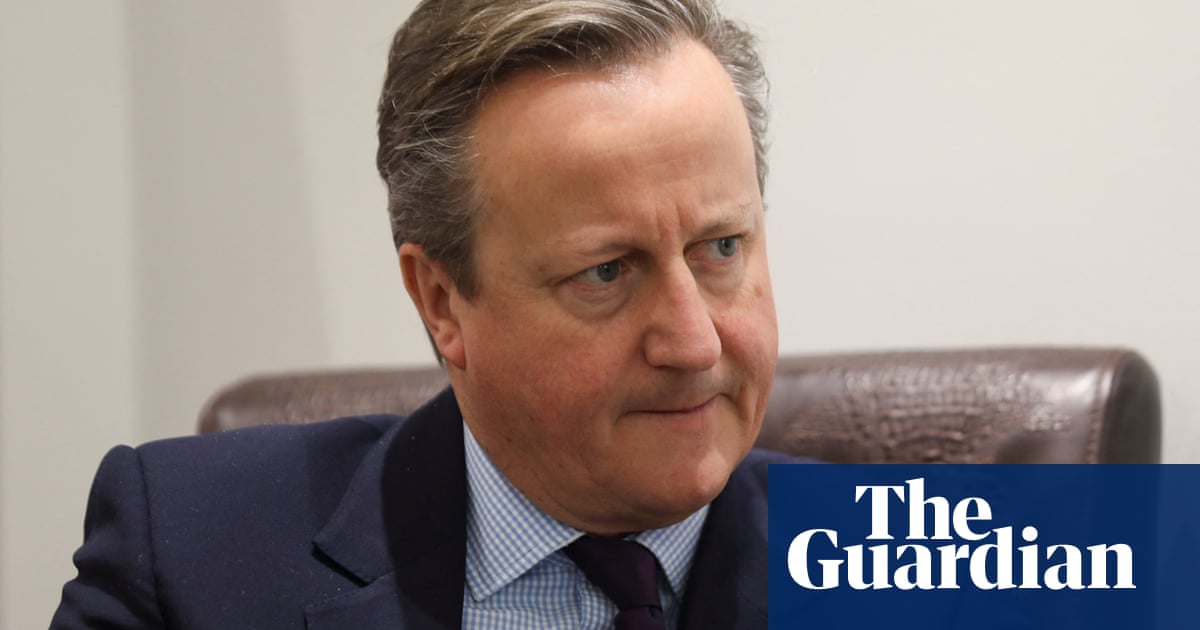
Labour has renewed calls for the Cabinet Office to investigate David Cameron’s connections with Greensill Capital and how the collapsed finance firm’s Australian founder was welcomed into the heart of government.
The shadow chancellor, Anneliese Dodds, and the shadow Cabinet Office minister, Rachel Reeves, have written to Simon Case, the cabinet secretary, posing a string of questions about the affair.
Fresh concerns were raised about Greensill’s access to senior decision-makers in the Cameron government on Tuesday after Labour produced a business card showing Lex Greensill as “senior adviser, prime minister’s office”, and giving a No 10 email address.
Sources close to Greensill confirmed the card was genuine, saying it dated from a period when the financier was acting in a formal role as a senior adviser to Cameron.
“These revelations raise further questions about the special access provided to the heart of government for Greensill and its linked companies,” said Dodds in the letter to Case. “The public have a right to know that their money is not being wasted or put at risk due to the Conservatives’ cosy connections with lending firms.”
The letter asks why Greensill’s role was not publicly disclosed at the time, and how much he earned from a supply-chain initiative for community pharmacies, launched by the government in 2012.
The scheme was initially run by Greensill’s former employer, the bank Citigroup, and then by his own company. Each time the scheme paid pharmacies upfront for government contracts – before later collecting the money from the government – they took a fee.
During his six-month stint as an adviser, Greensill was reportedly able to make the case to many Whitehall departments to use the kind of financing he was promoting.
Cameron took up a role with Greensill Capital after leaving No 10 and held share options in the firm, which collapsed into administration this month.
Cameron recently contacted the chancellor, Rishi Sunak, apparently in an attempt to win access to the Treasury Covid rescue schemes, the government’s Covid corporate financing facility (CCFF), for the troubled lender.
The chancellor defended his own role in the lobbying scandal, telling ITV’s Robert Peston he had rejected Greensill’s requests.
“There was a company who approached the Treasury, asking for a change to be made to one of our coronavirus support schemes – which they thought would then help lots of other companies – and we rejected, ultimately, the suggestion and decided not to take that forward.” he said.
In what some will see as a swipe at Cameron, Sunak said he thought lobbying rules should apply to everyone and declined to say whether he thought they had been followed in this case.
“I think it’s important that, whoever people are, whether they’re prime ministers or anyone else, that they follow the rules and the guidelines that we have in place for lobbying.”
The former prime minister has declined to comment since details of his role in Greensill’s collapse began to emerge.
Cameron was cleared last week by a watchdog, the Office of the Registrar of Consultant Lobbyists, on the grounds that as an employee of the firm his behaviour did not formally constitute lobbying. However, calls for an investigation have intensified.
It is understood most of Cameron’s texts to Sunak went unanswered and that Sunak later directed him to speak to Treasury officials, who denied Greensill access to the CCFF.
It has also emerged that the former head of Whitehall procurement took a job with the firm without being vetted by the appointments watchdog.
Bill Crothers joined the board in 2016, less than a year after leaving his post as the government’s chief procurement officer.
He did not obtain permission from the official advisory committee on business appointments (Acoba) which vets private sector appointments taken by former ministers and senior civil servants within two years of leaving their posts.
Two years later, in 2018, Greensill was involved in running a contract won by the US software firm Taulia to provide “supply chain finance” to NHS pharmacies.
Crothers told the FT he had “definitely followed all the procedures”, but declined to elaborate further. The Cabinet Office said it had received a letter from Acoba and would respond to it in due course.












